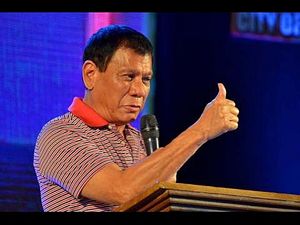The Philippines’ Rodrigo Duterte has just won the country’s presidency with a platform that focuses primarily on severely cracking down on crime. Duterte’s win might be the first electoral outcome in a year where several elections might lead to surprising winners. He is a controversial figure partly because of his unacceptably offensive remarks on women and reputation as a big-mouth, earning him the nickname of the “Philippines’ Trump” by some in the media. Leaving aside his domestic agenda, what is interesting (and troubling, depending on your perspective) is his policy stance towards the South China Sea disputes and China-Philippines relations.
As a general rule we should not take a presidential candidate’s comments and rhetoric during campaigning too seriously. Duterte’s case might be different, however. Duterte has commented before that he would personally stake out the Philippines’ sovereignty over disputed islands with China in the South China Sea and seek to negotiate with China in a bilateral setting. Instead of using an international legal approach to solve the disputes with China, as the Aquino government has done, Duterte wants to lower the already high tensions with China. He also wants to approach China with an emphasis on economics and development.
In a way, his comments and suggested new approach are not surprising at all. As I argued about two years ago in an essay, international law has its limits when it comes to island disputes in Asia. This is not to say that international law should play no role in solving disputes between nations; I merely made the point that we should not overly rely on international law to generate peace among nations. We do not live in an ideal international society where laws and norms are consensus and collectively shared and respected. The very legitimacy of international law will be damaged if legal decisions cannot be enforced.
In this sense, Duterte is wise to privilege economic development first while maintaining the Philippines’ sovereignty claims. Maybe this is because he comes from a very poor region of the Philippines, and thus understands better than most other politicians the importance of development and why it must come first. From this perspective, China can be a very importance source of investment and capital to help the Philippines’ development.
Nonetheless, it would be naive for China to believe that the Philippines would just back down from its territorial disputes with China, or ‘shut up,’ as Duterte once commented. The issue at stake is not just between China and the Philippines as it also involves other important regional players, such as Japan and even India. The United States, as the Philippines’ most important ally, undoubtedly plays a crucial role here as well. What is interesting and potentially troubling is the dual nature of the Philippines’ reliance on both China and the United States. In other words, the Philippines depends on the United States for security protection and it depends on China for economic development. Of course, the Philippines is not the only country that faces such a dilemma in the region; other states like Australia and South Korea also grapple with this problem.
So, while at the end of the day we do not know what Duterte will actually do with regard to China-Philippines relations as president, we can be certain that he will be more unpredictable than his predecessor. Given the already very cold state of China-Philippines relations, Duterte’s unpredictability might be a cause for optimism that this relationship will actually improve.

































